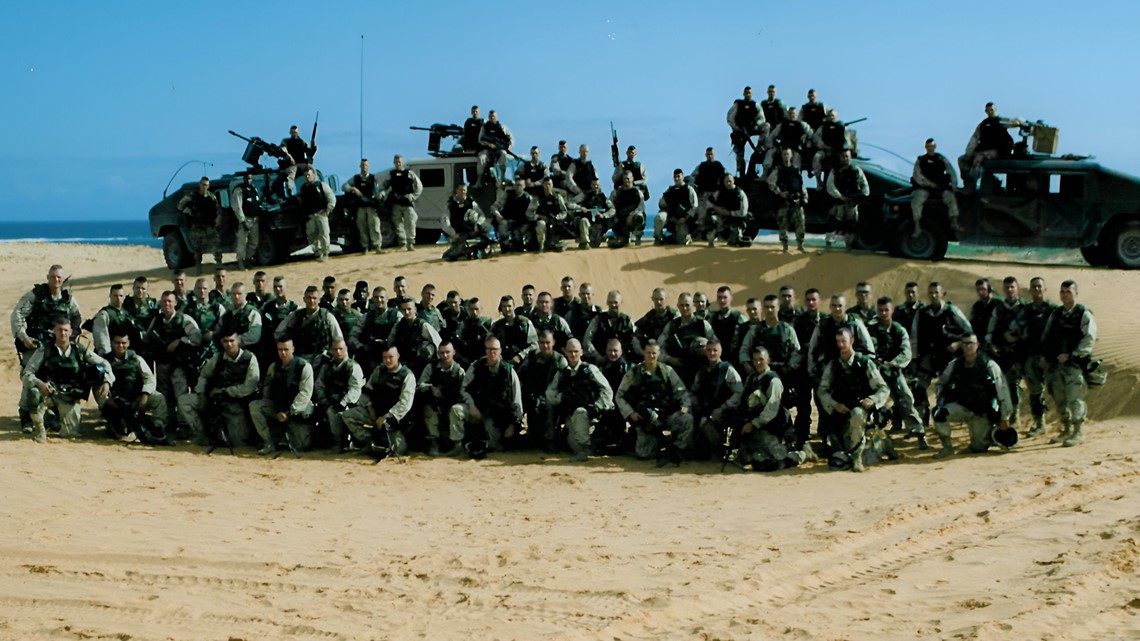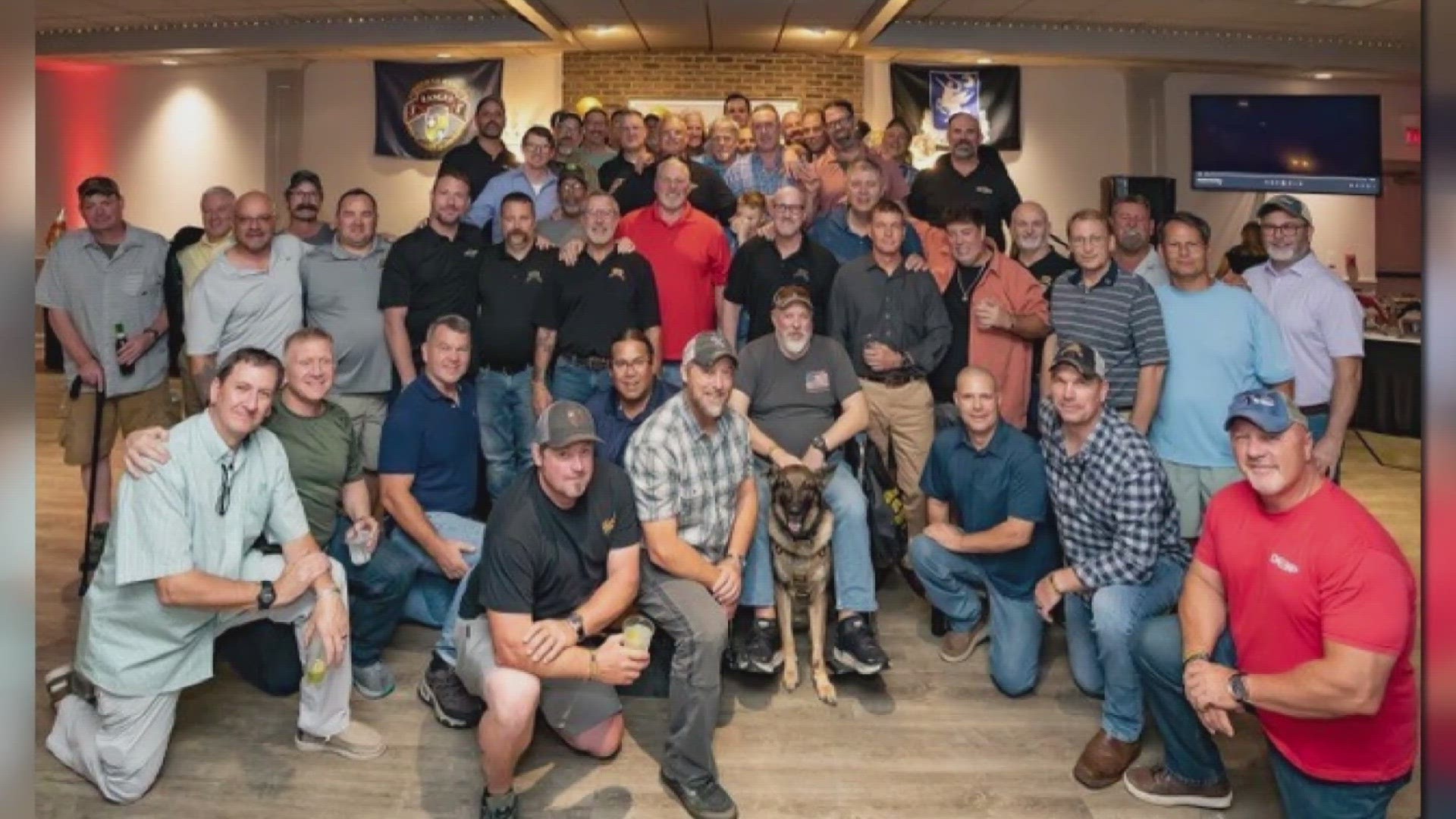KNOXVILLE, Tenn. — A recent reunion in Knoxville brought together a few dozen veterans, many for the first time face-to-face in 30 years.
“These opportunities are about healing and also meeting the people you had no idea had such an impact on your life,” said Army Ranger John Burns.
He helped organize a reunion of troops involved in the 1993 Battle of Mogadishu. The wounded warrior did it in part to try and save lives. Not long after the battle, a soldier involved in Task Force Ranger took his own life and almost 30 years later, just days before the reunion, another veteran of the historic firefight also killed himself.
“I absolutely know (the reunion) is a good start. One thing is everybody got to exchange numbers again — they know where each other's at, they got to look each other in the face,” said Burns.


U.S. troops involved in an 18-hour gunfight in Somalia gathered in Knoxville to mark a deadly battle in 1993. It captured the attention of the world and forever changed the lives of dozens of American soldiers in their early twenties.
Veterans of the Battle of Mogadishu say it felt like everyone in that coastal African city had a gun and was pointing it at them. U.S. troops ventured into the heart of a city on edge as part of an armed convoy during what was supposed to be a “quick” mission to capture a warlord.
“That day was just a powder keg waiting to happen,” said Scott Johnson.
He served as a combat helicopter pilot and rescued fellow wounded soldiers who survived a gauntlet of gunfire and a fight for survival lasting throughout the day and night of Oct. 3, 1993. He was 25 years old at the time, and the veteran combat pilot would go on to serve a 24-year career as an FBI Special Agent and most recently launched a private security firm.
WBIR first aired a story about his experience in Somalia in 2015.
“I think everybody in the city picked up an AK-47 and just started firing in the air and trying to shoot down everything they could shoot down," he said.
This year marks 30 years since the historic battle that inspired books and the 2001 movie, Black Hawk Down, referencing two American helicopters shot down in a conflict that left 18 Americans dead and 73 wounded, almost half of the U.S. troops involved in the operation.
“I’ve done a lot of great things over my career … but I think the greatest thing in my life was pulling these guys out of battle,” said Johnson.
He hugged and kissed veteran Army Ranger Burns on the top of the head while discussing his career. Both veterans joined fellow troops in running the annual Mogadishu Mile. It marks the final mile some troops had to run, shoot, and crawl to escape the bloodshed in the city and reach the safety of American reinforcements.
In addition to an on-camera interview with John Burns, he took time to answer the following ten questions about the impact of his military service on the rest of his life. Those questions are listed below.
10 QUESTIONS
1. What one person influenced you most in this life?
It would have to be My Grandfather. He served in two wars and he planted the seeds of military service in our family.
2. Do you feel honored and respected for serving your country?
I believe our nation is at a crossroad. I feel freedom is something that most humans struggle to grasp as Americans. Vietnam sowed seeds of entitlement and it has now manifest as inability to understand how precious our existence is as Americans.
3. How can people thank you for your service?
By entertaining the thought of teaching how we got here as Americans. Serve a cause greater than yourself here at home. That way the sacrifices I have made will not be in vain.
4. How do you think this generation of military men and women is different or similar than yours?
Most Americans who choose to serve, are looking for monetary upward mobility. This is dangerous in a world where despotism is king. Our freedoms must be fought for and continued in each successive generation. We are not entitled to freedom because we are born. Freedom must be refreshed by the blood of patriots.
6. What influence did your military service have on the rest of your life?
After serving in two conflicts and being wounded in war. I had to learn what all this freedom I was willing to die for is about. My military service shaped every decision I made after being discharged.
7. Does your family have a history of military service?
Both of my Grandfather’s served in WW2 and Korea. I have an uncle that served in Viet Nam, another that made a career of the Air Force. I have another uncle who served four years in the Army, and two cousins who served. My cousin Joey now has 15 years in the Army with multiple combat deployments. He is currently deployed in Poland as I pen these words.
8. Would I encourage younger generations in your family to join the service?
The evidence reveals that my combat service led to two of my cousins joining and serving in war. The greatest character trait I learned in life did not come from university. I learned true human empathy in service. To understand I am no better or no worse than any other human born of a woman. With this knowledge I hold out hope that the world can indeed be a better place.
9. How has your opinion of war changed?
War occurs when irrational humans can- not let go of presuppositions. War causes men to focus on only what divides us as humans. War is ananthema to peace. I am a warrior. I fought for my country so others would not have to. I found the journey to finding peace, even with life’s hardships and disagreements, to be far more enjoyable than taking human life and losing human life.
10. How did your military experience shape your faith?
I learned true faith in Jesus Christ while deployed outside of the United States, where comfort is an anomaly. Faith to me is about looking in the mirror and fixing what is wrong with myself, before I can influence others. My military service is where my true faith in God was born again. I learned that mercy and grace are divine attributes from God alone. Without God, men can not understand mercy. Mercy is empathy! True faith in God hinges on what he is doing, never what I am doing. The military prepared me for my ministry to men now returning from war.

